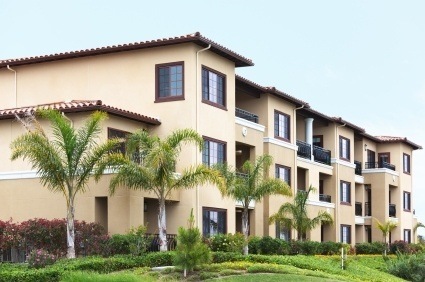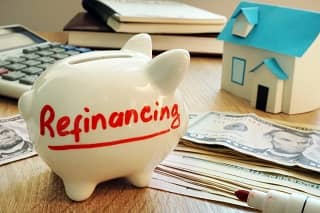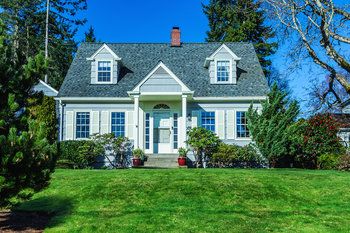 If you have a vacation home or investment property with an older, expensive mortgage, consider a refinance to take advantage of still historically low mortgage rates.
If you have a vacation home or investment property with an older, expensive mortgage, consider a refinance to take advantage of still historically low mortgage rates.
At a time when financial constraints have forced some borrowers to sell second properties, refinancing can help make the property more affordable.
"You can borrow money at a very low rate, and that makes financial sense," says Gibran Nicholas, CEO of CMPS Institute, a national organization that certifies mortgage lenders and bankers in Ann Arbor, Michigan.
If you're able to lower your mortgage rate by 1 percentage point or more, it could save you thousands of dollars, says Michael Moskowitz, president of Equity Now, a mortgage lending company in New York City. Besides getting a lower mortgage interest rate, refinancing your second mortgage could reduce your monthly payments or allow you to change your loan term.
Refinancing a vacation home is not much more complicated than getting a loan on a primary residence. However, getting approved for any mortgage is much more involved than it was before the housing crisis, Moskowitz says.
In order to qualify, you'll likely have to provide tax returns, several bank statements, and proof of income to show your ability to repay the loan, he says.
However, some key differences exist between getting a primary home mortgage and securing a refinance loan on a vacation or investment home.
Higher rates for second-home refinances
For starters, homeowners will likely pay a higher interest rate on refinancing a second home or investment property.
It used to be that rates for second home loans were pretty similar to those on primary residences, but this changed in 2022. To help support its affordable housing goals, Fannie Mae now adds additional fees for second home mortgages. These add-on fees range from 1.125% of the loan amount for loans with up to a 60% loan-to-value (LTV) ratio all the way up to 4.125% for second-home loans with LTVs greater than 80%. Unless the borrower wants to pay them out-of-pocket, these new loan-level pricing adjustments will add the equivalent of 0.375% to as much as two percentage points to the loan's interest rate.
For investment properties, these fees range from 2.125% percent of the loan amount for mortgages of no more than 60% percent of the home’s value to 4.125% percent for loans with LTVs greater than 80 percent. loans. If not paid up front in cash, this will translate into an increase in the interest rate between 0.625% and as much as about two percentage points.
With the change in 2022, mortgage rates for second homes are now much closer to those for investment properties.
Home equity is essential to refinancing a second property
You will need to have enough equity in your property to refinance -- plan on at least 20 percent, says Matt Hackett, mortgage risk manager at Equity Now. The home must appraise for an amount that is high enough to allow an acceptable loan-to-value ratio, he says.
That's a different standard than for primary residences, where homeowners may be able to qualify for Federal Housing Administration (FHA) financing with more lenient equity requirements, Hackett says. The loan amount you qualify for is based on your home's value. It’s difficult to refinance a second home if you have less than 20 percent equity. In other words, lenders prefer a loan-to-value ratio (LTV) of 80%. Moskowitz says it is possible to find a mortgage lender that will allow as little as 10 percent equity, but you may end up paying extra for it.
For example, you will probably end up paying for private mortgage insurance -- which can add nearly 1 percent to the payment -- to get your new mortgage approved.
Other requirements for a second home refinance
Credit score requirement
Government mortgage programs that serve low- and moderate-income borrowers such as FHA aren’t available for use for second homes or investment properties, nor are VA loans.. This means second home refinances are only available as conforming loans through Fannie Mae and Freddie Mac.
To be eligible for a conforming refinance on a second home, Fannie Mae and Freddie Mac require a minimum credit score of 620 or higher. However, you'll need a good-to-excellent FICO score between 680 - 760 to secure lower interest rates. For most borrowers, a mortgage refinance has the greatest value and can get you access to the lowest refinance rates available.
Debt-to-income ratio requirement
Your debt-to-income ratio is the percentage of your monthly debt, including credit cards and other obligations relative to your gross monthly income. For example, if you have a $2,000 monthly gross income and your monthly debts are $500, you have a 25% DTI ratio. Your debt ratio helps lenders assess your borrowing risk, and to be eligible for a mortgage most lenders require a DTI ratio of 43% or less.
Cash-out Refinance on a Second Home
Similar to home equity loans and home equity lines of credit (HELOCs), a cash-out refinance taps into your home's equity. In a cash-out refinance, you take out a new loan larger than your current mortgage, paying off your old loan and receiving the difference after deducting closing costs in cash. You can use the funds for virtually anything, including funding home improvements, paying off high-interest debt, or as a down payment for another home purchase.
A cash-out refinance of a second home should work the same as a primary residence cash-out refi. However, you'll likely need a higher credit score and leave at least 25% equity remaining in the home.
There are some arcane rules for what constitutes an investment home versus a second home.
Usually, this hinges upon whether or not you need the income the property generates to cover the required mortgage payment -- in which case the property is likely to be deemed an "investment home" -- or whether your income without that cash flow can support the mortgage.
Not all lenders will finance investment homes or finance all kinds of investment homes. Qualifying for a refi requires evidence of continued use of the property as a second home and not a rental property.
For a lender to deem the property a "second home" -- even if your income without the rent is sufficient -- the home must be a "reasonable distance" away from your primary home. That is usually akin to about 50 miles or so. It can be closer if the home is in an obvious vacation spot, such as near a beach or skiing area.
If it is just a normal home not all that far from where you live, the property is usually treated as an investment since you really have no compelling reason to stay there instead of your primary home.
Also, to be considered a second home, guidelines generally state that the borrower must occupy the property for some portion of the year. If the property and occupancy fail these tests, the property is treated as an investment.
Fannie Mae also lists additional requirements for your second home:
- It must be a one-unit place because duplexes, triplexes, and fourplexes are generally rented out
- It must be suitable for year-round occupancy
- You must have exclusive control over the property -- no management companies
- The property should not have time-share arrangements or be a rental property
- Short-term rentals are allowed, provided the income isn’t needed to qualify for the mortgage
What is more expensive to finance?
It is considerably more expensive and difficult to finance an investment home than a vacation home.
This is because when you refinance an investment property, the property's income is used to help you qualify for the mortgage loan. If something happens to that income, you may not be able to afford the loan payments.
Additionally, people may be considerably less attached to their rental across town than they are to a vacation house where the family celebrates July Fourth every year. As such, borrowers are statistically less likely to default on vacation homes than investment properties.
Second homes and occupancy fraud
Many homeowners acquire an investment property by purchasing it first as a primary residence, then converting it to a rental when they buy a new home for personal use.
If you originally financed the property as a primary residence, the income from the property was not a consideration. But now, you will have to document the property's cash flow with your tax returns.
If it hasn't been rented out long enough for you to have a Schedule E, mortgage underwriters will credit you with 75 percent of the rent. (You will have to provide signed rental agreements and proof that the rent has been paid.) Or an appraiser may be asked to create a rental schedule showing what the property should rent for.
But they shouldn't bother, he says, because the lender will review monthly bill statements and other records to check on the accuracy of the loan application.
"From an underwriting standpoint, we spend a lot of our time figuring out if it's truly a second home," he says.
If you own a second property, consider refinancing to take advantage of falling mortgage rates.
Keith Gumbinger contributed to this article.
(Image: slobo/iStock)




Hi my wife and I own two condominiums, the first one we bought it 11 years ago, two years ago we refinance to lower the interest and the years from 30 to 15, last year we purchased a second condo for an excellent price, we have more than 200,000 equity between the 2. We are thinking to refinance one of them to get cash out and for us make more sense to do it on the recent purchase, what do you recommend?
I live in VA. My Mother's house in WV is paid for and is in my name. She lives in it with a life time interest and doesn't pay me rent. Can I get a HELOC of some sort on it? I can never get an answer.
Getting a home equity loan or line of credit on a non-owner-occupied property can be a challenge. You might check with lenders who are physically local to the property, or those with offices in both your state and the state where the home is for convenience. If possible, it would be far simpler to take a line or loan against your primary residence.
Who would you recommend we try and refinance with- here are issues: 2nd home (we lived in it but had to relocate for work, not able to sell/rent due to remote location in a small town/lack of people looking to buy/rent); permanently affixed, manufactured home (not a single wide); on 40 acres we own; it is in the country and it is hard to get an accurate appraisal because of the location and lack of other comparable properties that are either for sale of have been sold recently; but most likely we do not have 20% equity, most likely maybe 10 if that much.
Amy, Unfortunately, we do not recommend specific lenders. But do call around lenders and compare rates and fees. Good luck, thanks for commenting. -Tim Manni, HSH.com
Is it better to finance a 2nd home acquisition loan with a lender in the town where the 2nd home is located, or where my primary residence is?
I have a property that I had before I married, I do not live in it. I moved to my husbands home in 2011 and my son lives in my home. It is owner financed, but I would like to refinance it and pull some cash out of it. Do you have any suggestions on how I should go about this?
Marie, Thanks for commenting. What you want to do is called a “cash-out refinance.” To do so, you need to have a good amount of equity in the property. How much equity do you have in your home? You should contact your current mortgage lender and a few more to compare quotes on a cash-out refinance on your property. Good luck, please let me know if you have any additional questions. -Tim Manni, HSH.com
Who would you recommend for a non-resident Arizona investment triplex refinance?
Valerie, We do not have a recommendation. Sorry.Thanks for contacting us, Tim
I would like to know what financial institutions do HELOCs on a second home. My second home is in MD and I am currently working in CA. I have great credit, good income, but most banks don't do HELOCs except for primary residences. Any suggestions?? Thanks, Paul
Great information however, every financial institution I talked to said they will NOT do a refi nor a HELOC on a second home. If you do not have a mortgage on it some will put a mortgage on it but only up to the amount that you paid for it and not the assessed value. Do you have any specific lending institutions that you recomend I talk to about applying for a loan for my second home? Maybe there are some that I haven't checked with yet.
Lena, Since a refi and a HELOC are two different products with two different purposes, I need to know what your intention is with your second-home loan -- do you need to lower the mortgage payment or are you seeking to pull money out of it for repairs or other needs? Once we know that we can help further. Thanks, Tim Manni, HSH.com